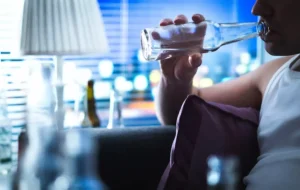
Research has found that alcohol affects the process of blood coagulation. „Coagulation” is a term used to describe the process of blood cells known as platelets sticking together. When a person experiences an injury, those platelets travel to the area to form together into a blood clot to stop the bleeding.
Can I drink alcohol if I have high blood pressure?
Bayview Recovery Center provides varying levels of care with a focus on outpatient treatment programs at our Tacoma, WA drug rehab center. Our treatment methods allow our clients to have the most accessible and effective recovery experience possible. Certain individuals may develop skin problems like rashes, bruising, and other dermatological issues as a result of blood thinner usage. Specific blood thinners, especially in women, may elevate the likelihood of bone loss and osteoporosis. You can, but you should consult your doctor before making that choice.

Is this a short-term effect?

After all, combining alcohol with prescription blood thinner can cause uncontrollable bleeding, externally or internally. So, how do you handle alcohol and stop bleeding risks for someone on blood thinners? Not only does alcohol thin your blood, does alcohol thin or thicken blood but long-term alcohol abuse can also increase your risk of conditions ranging from diabetes to liver disease to cancer. If you’re struggling to control your drinking, then you may have a more serious problem. As we mentioned earlier, thin blood can increase your risk of excessive bleeding and stroke.

Alcohol can also interfere with the activity of certain enzymes involved in blood clotting, such as thrombin.
- At best, the effect of alcohol can last long enough if it is consumed in moderation and on every alternate day.
- Over time, the elevated calorie intake related to alcohol consumption can lead to obesity, a higher risk for developing diabetes, high blood pressure, and heart failure.
- Start with thirty minutes a day and build up your stamina to your personal optimal level.
- Her blood returns to normal fairly quickly after the alcohol leaves her system.
The rest is made up of red blood cells, white blood cells, and plasma. Long-term heavy drinking Halfway house is linked to an elevated risk of several cancers, including liver, breast, esophagus, and mouth cancers. However, without the clotting function of your platelets, you could bleed out after getting a paper cut. Platelets (otherwise known as thrombocytes) gather at the site of an injury and stick to the injured blood vessel in order to staunch the bleeding by forming a clot. This covers the wound and prevents further blood from leaking out. But, if the blood is too thin, the body may not be able to coagulate blood after an injury.
Does Wine Thin Your Blood?
Blood-clotting in the circulatory system is referred to as thrombosis. Even minor injuries, such as scratches, can damage blood vessels and cause bleeding. To control excessive bleeding and ensure an injury does not become life-threatening, the blood clots. When alcohol is introduced into the equation, the blood’s ability to clot is compromised. Short- and long-term alcohol use has different effects on the blood.
- Therefore, a person should not drink alcohol instead of taking blood thinning medications as a doctor has prescribed.
- This may result in unpredictable variations in drug levels in the body.
- This means that alcohol can potentially slow down the formation of blood clots.
- Luckily, alcoholics who quit drinking see a reduction in blood pressure.
Blood cells, called platelets, move to the injured area of the body when you’re cut or bruised. These cells are sticky and cluster together and work to stop bleeding. Platelets also deliver proteins called clotting factors that create a plug to close a wound.

What are the Risks of Drinking Alcohol While Taking Blood Thinners?

However, when the serving was increased to twice the original amount, blood-thinning effects were observed. There are many health conditions impacted by alcohol consumption. Cardiovascular disease is one of the most common and high-risk problems that can go hand in hand with having a drink. However, this lack of blood clotting caused by alcohol could also potentially increase your risk for hemorrhagic strokes or strokes that occur when weak blood vessels burst. The risk of “bleeds” or bleeding strokes also increases as a result of heavy alcohol use. Alcohol can cause blood vessels to constrict or narrow, reducing blood flow to various parts of the body.
How Long Does Unopened Wine Last? (Plus, Tips for Storage)
Some research finds that alcohol increases levels of high-density lipoproteins (HDL, aka “good cholesterol”). This healthy type of cholesterol helps protect your arteries and prevent the blood clots that can lead to heart attacks and strokes. Blood thinners, also known as anticoagulants, are medications designed to prevent the formation of blood clots or to inhibit existing clots from getting larger. These drugs play a crucial role in managing conditions related to blood clotting and circulation. Blood clots can be harmful, leading to conditions such as deep vein thrombosis (DVT), pulmonary embolism, stroke, or heart attack.


Leave a Reply